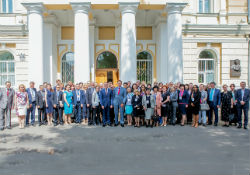11 countries convene in Moscow to discuss use of law for prevention of NCDs

WHO
WHO considers use of law as an important policy tool for the prevention and control of noncommunicable diseases (NCDs). Notably, the introduction of appropriate legislation is central to achieving the vision of a tobacco-free Europe, reducing the harmful use of alcohol and promoting healthy diets – three of the leading modifiable risk factors for NCDs.
The WHO Regional Office for Europe therefore organized an intensive training workshop on law and NCDs on 30 May–3 June 2016 in Moscow, with the I.M. Sechenov First Moscow State Medical University and the McCabe Centre for Law and Cancer.
The workshop was organized by the Regional Office in the context of the Project on the Prevention and Control of NCDs, financed by the Ministry of Health of the Russian Federation. The workshop targeted policy-makers and government lawyers working in public health, as well as representatives of the trade and economy sectors. Representatives from 11 countries in the European Region participated, notably from Central Asia and the Caucasus. This WHO training course on NCDs will be one of the first to reach such a mixed audience.
High-level representatives were present at the opening and closing sessions, hosted by the I.M. Sechenov First Moscow State Medical University, including: Deputy Minister of Health Dmitriy Kostennikov; First Deputy Chairman of the State Duma Committee on Health Nikolai Gerasimenko; Director of the Department of Social Development, Ministry of Economic Development, Yulia Mikheeva; Dr Svetlana Axelrod, Deputy Director, Department of International Cooperation and Public Relations of the Ministry of Health; Dr Haik Nikogosian, WHO Representative and Head of Country Office for the Russian Federation ad interim; Dr Gauden Galea, Director, Noncommunicable Diseases and Health Through the Life-course at the WHO Regional Office for Europe; Rector Petr Glybochko of the I.M. Sechenov First Moscow State Medical University; and Mr Ruslan Khalfin, Director, Higher School of Health Administration.
The Global Action Plan for the Prevention and Control of Noncommunicable Diseases 2013–2020 and other global and regional action plans and strategies provided the basis for discussions, and other global lessons – such as the introduction of standardized packaging for cigarettes – were based on implementation of the WHO Framework Convention on Tobacco Control. All these documents recognize the importance of considering trade measures, taxes and subsidies, appropriate packaging and labelling standards and marketing restrictions among other policy options. Many of these policies require the use of legal approaches and careful design.
Many experts from both the Russian Federation and abroad, including the University of Liverpool, contributed to the training programme, which was considered a great success.
The objectives of the workshop were to:
- consider effective policy options and legal approaches to reducing tobacco and alcohol use, unhealthy diets and obesity;
- analyse relevant international and regional health, trade and investment instruments and processes and consider their implications for reducing the burden of NCDs through legal approaches;
- identify ways to achieve effective multi-sectoral collaboration and improve policy coherence for NCD prevention, notably between health and trade sectors;
- establish and strengthen professional capacity and networks for reducing the burden of NCDs; and
- design practical steps for reducing the burden of NCDs through legal approaches in participating countries and/or regionally in the context of broader global governance themes and processes.
On the basis of this experience and after further tailoring of material to our target audiences, the WHO Regional Office for Europe will seek to repeat and expand such training opportunities.



